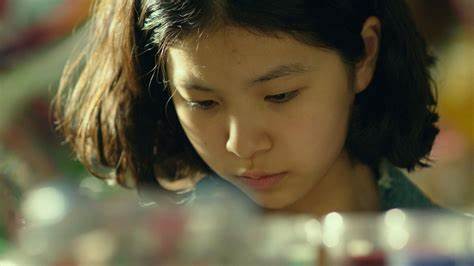South Korea’s “The Hill of Secrets” is a seemingly simple coming-of-age tale that turns out to be more complex than it first appears. Set in a small city near Seoul in 1996, the film revolves around Myeong-eun (Lee Ji-eun), an 11-year-old elementary school girl who is very sensitive about how her schoolmates and their classroom teacher regard her. During the opening scene, we see her trying to choose anything good enough as a gift for her teacher, and we are amused a bit as she becomes rather capricious about a little packaging detail of her gift at the last minute.
In the classroom, Myeong-eun presents herself as well as she can when she later runs for the prefect. She makes a direct and forthright speech with a practical promise for her classmates and eventually wins the election, to her delight. Still, her parents are preoccupied with their own business. While her father, Seong-ho (Kang Gil-woo) is nothing but a pathetic unemployed loser who usually kills his free time at his wife’s little shop located in a local marketplace, her mother, Kyeong-hee (Jang Sun) is frequently busy with her work. Their attention is often drawn more to Myeong-eun’s older brother Min-gyoo (Choi Hyeon-jin).

Just like Kyeong-hee is sick of her stepfather and stepbrother, Myeong-eun is tired of her family, which is why she has lied about her family to her classroom teacher and classmates. She tells her teacher and classmates that her father works in some big company while her mother is just a plain housewife, and then, unfortunately, she must stick to her lies more when she begins to serve as the class prefect. As a constant overachiever who would even impress Reese Witherspoon’s memorable student in “Election” (1999), she is quite an active and productive prefect. Still, she also has to evade any questions about her family. She even goes for bigger lies when one of her classmates later shows some doubt about what she has been saying about her family, and what follows next is one of the film’s funniest (and most alarming) moments.
As we wonder and worry more about how much our little young heroine can possibly contain her lies and secrets, there comes a little change in her classroom one day. A girl named Hye-jin (Jang Jae-hee) is transferred to the school along with her “biovular twin sister,” and this girl does not mince any word about her rather shabby family background right from her first day in Myeong-eun’s classroom. In addition, she and her sister can also write a personal essay that appeals to others a lot more than the one written by Myeong-eun, whose jealousy grows as Hye-jin’s writing is so effortless compared to the result of her strenuous efforts. When her classroom teacher later instructs her to participate in a big local essay contest for elementary students, Myeong-eun tries her best again. Still, it looks like she cannot possibly beat whatever these two sisters write.
To Myeong-eun’s surprise, Hye-jin and her sister do not hesitate to befriend her. As a matter of fact, they indirectly give her useful advice for any aspiring young writer out there. Although their essays may not be as skillful or well-prepared as Myeong-eun’s, the casual honesty in their unadorned writing draws attention. After all, any good writer must show some honesty between the lines to connect with their readers, right?

While never making excuses for Myeong-eun’s several serious acts of deception, director/writer Lee Ji-eun, who makes a feature film debut here, sensitively depicts Myeong-eun’s potential as a future writer via a series of plain but subtly poetic moments. During one sequence late in the film, the mood becomes lyrically pensive as Myeong-eun comes to reflect more on her life and family via her sharply honest observations. Although she still does not like her family much, she accepts them as an undeniable fact of her life, and she comes to feel her moral responsibility as a writer, learning that the pen can really be mightier (and more hurtful) than the sword.
Several other main characters around Myeong-eun may feel a bit broad at first, but they eventually develop enough life and personality of their own. Jang Sun and Kang Gil-woo bring some human complexity to Myeong-eun’s economically struggling parents, and Choi Hyeon-jin, Kwak Jin-moo, and Lee Dong-chan are also well-cast as Myeong-eun’s other family members. While Lim Sun-woo is terrific as Myeong-eun’s flawed but caring class teacher, Jang Jae-hee and Moon Seo-hyeon have their own moments to shine too as Myeong-eun’s unexpected friends/competitors.
Overall, “The Hill of Secrets,” which I selected as one of last year’s best South Korean films, is an intimate coming-of-age tale about personal growth and the ethics of writing. When it eventually arrived at the end of her emotional journey, I discovered that I cared a great deal about Myeong-eun, sensing her growth as a writer and human being.

